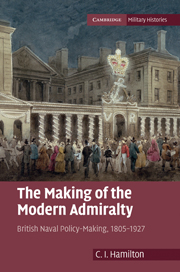Book contents
- Frontmatter
- Contents
- List of tables
- Preface
- Introduction
- 1 Lord Barham's Admiralty: 1805
- 2 Admiralty reform, 1806–1835
- 3 Decision-making at the Admiralty, c. 1806–1830
- 4 Admiralty administration and decision-making, c. 1830–1868. The Graham Admiralty
- 5 The Admiralty reformed again: context and problems, 1868–1885
- 6 Administrative and policy-making responses, c. 1882 onwards
- 7 Fisher and Churchill, and their successors, 1902–1917
- 8 The Naval Staff, planning and policy
- 9 Lord Beatty's Admiralty
- Conclusion
- Appendix 1 First Lords, First Sea Lords and Permanent Secretaries, 1805–1927
- Appendix 2 Acronyms and definitions
- Manuscript sources and select bibliography
- Index
2 - Admiralty reform, 1806–1835
Published online by Cambridge University Press: 03 May 2011
- Frontmatter
- Contents
- List of tables
- Preface
- Introduction
- 1 Lord Barham's Admiralty: 1805
- 2 Admiralty reform, 1806–1835
- 3 Decision-making at the Admiralty, c. 1806–1830
- 4 Admiralty administration and decision-making, c. 1830–1868. The Graham Admiralty
- 5 The Admiralty reformed again: context and problems, 1868–1885
- 6 Administrative and policy-making responses, c. 1882 onwards
- 7 Fisher and Churchill, and their successors, 1902–1917
- 8 The Naval Staff, planning and policy
- 9 Lord Beatty's Admiralty
- Conclusion
- Appendix 1 First Lords, First Sea Lords and Permanent Secretaries, 1805–1927
- Appendix 2 Acronyms and definitions
- Manuscript sources and select bibliography
- Index
Summary
Oiling the machine, 1806–1815
Lord Barham retired as First Lord in February 1806, once Pitt had died, but remained as chairman of the Board of Revision. That Board still had a few years of life, and continued issuing reports. There was one large-scale proposal made, in the fifteenth report, to create a brand-new eastern dockyard which would have all the modern amenities, in particular an extensive application of steam power so that scarce labour could be economised upon. The scheme, however, fell by the wayside, in part because improvements to the existing yards made a new one redundant. The Board of Revision was otherwise essentially concerned with means of getting the existing system to work better, notably through introducing committees to the Victualling and Transport Boards, issuing detailed descriptions of the duties and responsibilities of officials in London and beyond, and trying to regularise methods of work and payment in the dockyards. Lacking grand ambition, and dull because of detail, these kinds of things were vital to the improvement of naval efficiency. However, the Board for a time ran into opposition from the Admiralty, its reports not read, let alone acted upon. The new First Lord, Charles Grey (later Earl Grey) was one of St Vincent's political friends, and similarly preferred more trenchant reform, especially on the lines of individual responsibility.
- Type
- Chapter
- Information
- The Making of the Modern AdmiraltyBritish Naval Policy-Making, 1805–1927, pp. 42 - 79Publisher: Cambridge University PressPrint publication year: 2011

